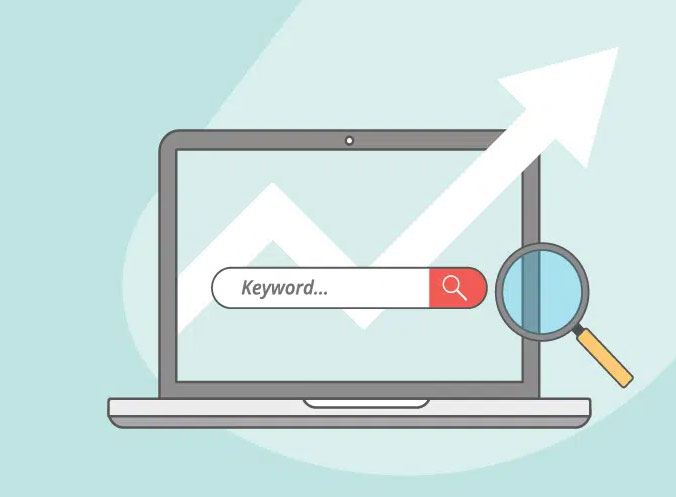Brands that want to grow their online presence know that SEO keyword research is crucial. While keyword research can be time-consuming, the payoff is more than worth it in the end, as it gives you a foundation upon which to craft more quality content, optimize your website for users and search engines, and ultimately bring more qualified, conversion-friendly traffic to your website.
In this article, we’ll dive deeper into the difference between branded keywords and non-branded keywords, why they’re important, and what you can do to find the best ones for your business.
What Are Branded Keywords?
Branded keywords are essentially what they sound like: keywords that include your brand’s name or some variation of it, including any misspellings. These might range from products your company sells and services you offer, to any topics your business might have authority or expertise in. For example, branded keywords for our marketing agency might include “VELOX,” “VELOX Media,” “VELOX agency,” etc.
This means that if someone were to hop onto Google or another search engine and type in those keywords, our brand, website, services, and even our social media accounts would pop into the results, potentially driving very targeted traffic to our website. In the same vein, a person searching “McDonald’s” or “iPhone” shows a clear intent to find products or services related to those brands.
What Are Non-branded Keywords?
Non-branded keywords, on the other hand, are broader keywords that are related to your business but don’t directly include your brand name. They might be products you sell, a range of services you offer, or even content you’ve published to address the pain points of potential clients and customers.
To use our agency as another example, non-branded keywords for our business might include something along the lines of “SEO agency” or “digital marketing agency.” Despite not including our brand name, these are still phrases we’d be interested in optimizing and ranking for, as they’re phrases potential clients might use when they hunt for the types of services we offer.
Why Are Branded Keywords Important?
One of the first things to consider about branded keywords vs. non-branded keywords is the difference in their reach. Because branded keywords include the name of your brand, you’re addressing an audience who already knows about you and is interested in learning more about what your brand can provide. Additionally, these types of keywords indicate a customer who is towards the end of their buyer journey, making them more likely to convert into a sale. In fact, while research shows that branded keywords comprise only 10% of all searches, they have a significantly higher conversion rate than their non-branded counterparts.
Why Are Non-branded Keywords Important?
While branded keywords are great for speaking to an audience who already knows what you can offer, non-branded keywords are an excellent way to expand your company’s organic reach. By incorporating these keywords into your overall digital marketing strategy, you can attract customers looking for the products and services you offer, meeting them at different stages of the sales funnel.
To expand on one of the above examples, let’s suppose an online fashion retailer was looking to hire a third party to help with their digital marketing efforts. While there are a number of ways they can go about doing so, a good start would be to hop onto Google and type something like “fashion marketing agency” or “fashion digital marketing” into the search bar. Because our agency has taken the time to work these keywords into our website, marketing materials, and link-building efforts, we stand a much greater chance of grabbing the attention of these users, especially if we do our part to stay on top of other SEO optimizations in the process.
How both tap into Search Intent
Businesses looking to improve their online search rankings need to target a large number of keywords and search phrases to make that happen. While there are millions of search terms and combinations out there, each encompassing a variety of different goals, these searches typically boil down to four primary types of search intent:
Informational Intent: Refers to users who are looking for more information, often phrasing their searches in the form of a question. As a result, most informational searches include modifiers like “who,” “what,” “when,” “where,” “why,” or “how” to help narrow things down.
Navigational Intent: Refers to users who are looking for a specific page URL or website. As such, many navigational searches tend to include branded keywords, as searches like “Netflix login” or “Apple customer service” leave no doubt about the intent of the person searching those terms.
Commercial Investigation Intent: Refers to users who are in the process of narrowing down their choices between a few different brands, products, or services. Searches in this category typically include modifiers like “best” or “versus,” but they might also include brand names as well. For example, someone on the cusp of buying a new TV might search “Samsung vs LG” if they’re having trouble making a decision. At the same time, these users are the type most likely to click on product reviews, descriptions, or targeted content to help them learn more about each brand.
Transactional Intent: Refers to users who are in buyer mode and ready to make a purchase, often knowing exactly which product, brand, or service they’re looking for. Like navigational searches, transactional intent queries also tend to be branded, encompassing B2C transactions, B2B services, and even charitable donations. Since these users are well beyond the research phase, they’re much more likely to convert into a sale.
Ways Branded Keywords Can Improve Your Marketing Efforts
Branded Keywords, Competitors and Search Presence
While we touched on it above, there are several ways that branded and non-branded keywords can improve your business’s marketing efforts. Branded keywords, in particular, are one of the best ways to gain powerful insights into how others see your business and what you can do to improve that image. You can Google your own company and learn more about what your target audience already knows about you. At the same time, you can learn more about the search presence and ad strategies of your closest competitors. Searching branded keywords and adding research-related modifiers like “competitors,” “alternatives,” or “reviews” can give you a sneak peek at the types of ads that your competitors are running. Likewise, you might even be able to see how your competitors are stacking up when it comes to mentions on industry blogs or news outlets.
Branded Keywords and Customer Engagement
If that weren’t enough, branded keywords can provide your business with more opportunities to offer better customer support, especially through your social media channels. Put simply, modern consumers vastly prefer to voice their opinions or resolve their brand issues via Facebook, Instagram, and Twitter. These channels offer a direct line between buyers and businesses, making them much more immediate and accessible than long phone calls or email chains. In fact, statistics show that 47% of U.S. consumers have a more favorable view of brands that respond to their concerns on social media. By keeping a close eye on your branded keywords via social media, you’ll be better equipped to handle customer concerns as they crop up. Positive mentions of your brand can be used to bolster your marketing efforts, as success stories and favorable reviews make for great SEO content. Likewise, negative mentions of your brand can be just as useful. While no one loves a negative review, your public efforts to resolve these issues can show potential customers and clients that your brand values consistent, authentic, and honest communication. As one of the pillars of building your brand’s social media presence, this adds a whole new layer to the effect branded keywords can have on your marketing strategy.
Branded Keywords and PPC Campaigns
If your brand is also running PPC campaigns (hint: you should be), you can take advantage of the number of benefits that branded campaigns provide. For starters, branded campaigns are usually far less expensive than other paid ads, as the relevancy of your content for these types of queries means you can potentially capture those searches with a much lower bid. At the same time, branded campaigns offer you the chance to bolster low-search products and services. If you find some of your product or service landing pages aren’t getting as much traffic as you’d like, a branded campaign can be a cost-effective way of drawing attention to them. If that weren’t enough, branded campaigns grant you the freedom to choose your own messaging. This means that should you wish to test different sets of ad copy to find the best fit, you can do so in a less expensive environment. While these are only a few of the many benefits of branded PPC campaigns, they go to show how easily you can turn your marketing issues around with the right approach.
Ways Non-Branded Keywords Can Improve Your Marketing Efforts
There’s no question that branded keywords and campaigns can help improve your marketing efforts on their own. That being said, they work best when combined with non-branded keywords and strategies, as the combined approach works to meet customers at different stages of the sales funnel.
Non-Branded Keywords And Brand Awareness
With non-branded traffic being more organic, this also makes for an excellent way to build brand awareness and authority in your chosen industry. Your business will likely be targeting a wide range of keywords, long-tail keywords, and search phrases to reach as much of your target audience as possible, and that applies whether you’re selling swimwear, baby products, or home gym equipment. With Google placing such a heavy emphasis on user experience and searcher intent in its rankings, your brand’s content marketing strategy has to be well-planned and executed, with optimized landing pages and targeted search phrases that serve searcher intent.
Non-branded Keywords and Content Marketing
Whatever non-branded keywords you decide to rank for, you can use the insights gathered from your research to craft high-quality content around those keywords. The more diverse the content, the better, as modern consumers tend to engage with everything from blogs to videos, podcasts, and social media posts. The more useful the content, the more likely you’ll rank for those non-branded keywords, helping you to build trust and authority with your target audience.
How Can I Find the Best Keywords for My Business?
Google Suggest and Autocomplete Features
With branded keywords and non-branded keywords being so important to your digital marketing efforts, it’s a good thing that finding the right ones for your business is relatively easy. For branded keywords, you can start by doing a quick Google search of your own company, paying close attention to what gets highlighted by Google’s autocomplete feature. If we search our own agency, for example, some of the first results are “VELOX Media,” “VELOX Media glassdoor,” “VELOX Media reviews,” etc. These are suggested because others have searched for these phrases before, so that gives us an idea of what people want to know about us when they hear about us initially. For eCommerce businesses especially, the autocomplete feature can provide a good glimpse into the types of content that might be worth expanding on, especially if the top searches appear to be product-related or in season.
Google Related Searches
Google’s “Related Searches” feature is also an excellent source of branded keywords, providing deeper insights into a few of the searches that might have popped into that autocomplete field. Located at the bottom of Google SERPs, you can click on or search each of the phrases listed for a better understanding of what your target audience wants to know about your business.
Google Analytics Queries Report
As one of the most powerful SEO tools in your arsenal, Google Analytics is chock full of valuable information and features. If you’ve connected your Google Analytics to Google Search Console, you can use the Queries report to filter for the name of your brand. You’ll see the number of branded queries, the impressions and CTR (click-through rate) of each, and the average position.
Google Search Console
As another powerful SEO tool, Google Search Console can improve the performance of your business on Google Search, with features designed to help you monitor, maintain, and optimize your website’s organic performance. Among its many features, GSC allows you to see which search queries are driving the most traffic to your website, making it an effective way to devise new ideas for keywords and content down the line.
Optimize Your SEO and Keyword Strategies with Help From the Digital Marketing Experts at VELOX Media
Ultimately, branded and non-branded keywords remain an important part of your overall digital marketing strategy, helping your business to find new customers and drive more conversions. Should you need some assistance optimizing your online campaigns, the digital marketing experts at VELOX Media can help!
As a Google Premier Partner with over 10 years of experience in SEO, search marketing, and web development, our team has worked with B2C and B2B companies across multiple competitive industries. Learn more about what VELOX Media can do to help grow your online business today.
About the author:
VELOX Media is an award-winning, ROI-focused digital marketing agency that specializes in strategy, organic search marketing optimization, paid management, and web development.
We specifically target a 400%-800% monthly ROI above spend and are ranked among the top 3% of agencies in the world by Google.





